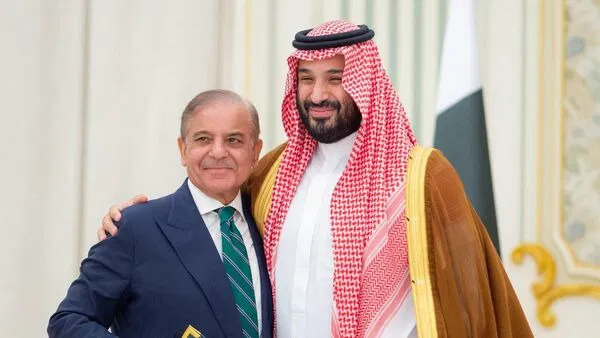
On 17 September 2025, Pakistan and Saudi Arabia signed a landmark defense agreement in Riyadh. The Strategic Mutual Defense Agreement commits both nations to treat any attack on one as an attack on both. This decision reflects a deepening of military ties and signals a new phase in bilateral relations.
Shehbaz Sharif’s Riyadh Visit
The agreement was signed during the official visit of Pakistan’s Prime Minister Shehbaz Sharif to Saudi Arabia. He was welcomed at Al-Yamama Palace in Riyadh by Crown Prince and Prime Minister Mohammed bin Salman. The high-level meeting culminated in the signing of the defense pact, marking a milestone in Saudi-Pakistan cooperation.
Details of the Agreement
According to official statements, the pact strengthens joint deterrence and security cooperation. Any act of aggression against either country will be considered aggression against both. The agreement aims to enhance military collaboration, deepen defense strategies, and secure regional stability. It highlights decades of historic ties, brotherhood, Islamic unity, and shared strategic interests between Pakistan and Saudi Arabia.
Joint Statement Highlights
A joint declaration emphasized that the pact is based on mutual trust and historic cooperation. Both governments reaffirmed their commitment to strengthen collective defense capabilities. The statement described the agreement as a natural extension of more than eight decades of bilateral ties. It highlighted solidarity against external threats and pledged coordinated responses to aggression.
Delegation from Pakistan
Prime Minister Shehbaz Sharif was accompanied by a large ministerial delegation. The team included Foreign Minister Ishaq Dar, Defense Minister Khawaja Asif, Finance Minister Mohammad Aurangzeb, Information Minister Attaullah Tarar, Environment Minister Musadik Malik, and Special Assistant Tariq Fatemi. The presence of key ministers demonstrated Islamabad’s commitment to expanding cooperation with Riyadh.
Third Gulf Visit in One Week
This was Sharif’s third visit to the Gulf region in one week. Before Riyadh, he traveled twice to Qatar on 11 and 15 September. In Doha, he attended emergency meetings of Arab-Islamic countries following Israeli strikes on Hamas leadership. His repeated trips underline Islamabad’s push to strengthen alliances in the region.
Background of the Deal
The defense pact was signed just one week after Israel’s unexpected strike on Qatar’s capital Doha on 9 September. The attack, reportedly backed by the United States, shocked Gulf nations. It raised questions about Washington’s reliability as a security guarantor for allies like Qatar, Saudi Arabia, and the UAE. For Riyadh, the strike underscored the urgency of securing new defense commitments.
Impact on Saudi-US Relations
Saudi Arabia, a longtime partner of the United States, is reassessing its defense needs. The Riyadh-Doha incident exposed vulnerabilities despite American military bases in Qatar. Saudi leaders now seek greater security assurances. Although Riyadh is negotiating a new military deal with Washington, it has not yet succeeded. The pact with Pakistan fills part of that security gap.
Pakistan’s Strategic Concerns
For Pakistan, the agreement is equally significant. After the Sindoor Operation, Pakistan realized that no external power came to its aid. This defense pact ensures that Islamabad has a strategic ally in Riyadh. The agreement signals that Pakistan will not face isolation in case of future conflicts.
Message to Iran
The deal also carries a clear message to Iran. Although Saudi Arabia and Iran recently attempted to normalize relations, the Riyadh-Islamabad defense pact could reignite regional rivalry. By aligning with Pakistan, Saudi Arabia strengthens its position in the Gulf. For Iran, this represents a new challenge to its growing influence in the region.
Strengthening Bilateral Relations
Saudi Arabia and Pakistan share historic ties, often rooted in religion, culture, and security. The new defense pact is seen as an extension of this partnership. Both nations already cooperate on trade, energy, and labor agreements. The defense deal formalizes their security collaboration at an unprecedented level.
Implications for Regional Security
Regional observers believe the agreement could reshape Gulf security dynamics. With Saudi Arabia and Pakistan pledging mutual defense, a new axis of cooperation emerges. This could deter adversaries but may also fuel rivalries, particularly with Iran. The pact adds another layer to the already complex Middle East security environment.
Domestic Response in Pakistan
In Pakistan, the government has presented the deal as a major diplomatic success. Leaders emphasized that the pact enhances Pakistan’s international standing. Opposition parties, however, may raise questions about the potential costs and responsibilities tied to such agreements. The public largely views Saudi Arabia as a trusted ally, which may strengthen domestic support for the deal.
Reactions in Saudi Arabia
For Riyadh, the pact bolsters security commitments at a time of regional uncertainty. Crown Prince Mohammed bin Salman has been seeking to modernize Saudi Arabia’s defense posture. The agreement with Pakistan is expected to complement Riyadh’s ongoing defense partnerships while diversifying its security alliances.
Global Repercussions
Internationally, the agreement may attract attention from Washington, Beijing, and Moscow. The United States, already under scrutiny for its role in the Qatar strike, may view this pact cautiously. China, with strong ties to both Islamabad and Riyadh, may welcome the deal as it aligns with Beijing’s regional outreach. Russia may also see it as a counterbalance to Western dominance in the Gulf.
Challenges Ahead
While the agreement is historic, implementing mutual defense commitments may face challenges. Questions remain about operational frameworks, joint exercises, and resource sharing. Critics warn that such deals can escalate tensions rather than ensure stability. Both nations will need to carefully balance commitments with diplomatic engagements.
Long-Term Strategic Outlook
For Pakistan, the pact ensures a reliable Gulf partner in defense. For Saudi Arabia, it provides additional deterrence against external threats. Together, the two countries hope to project strength and unity across the Islamic world. The agreement could become a foundation for broader multilateral defense arrangements in the Middle East.
The Pakistan Saudi Arabia Defence Deal marks a turning point in bilateral relations. By signing the Strategic Mutual Defense Agreement, both nations have pledged to protect each other from aggression. While the pact promises stronger deterrence, it may also heighten regional rivalries. Whether it strengthens peace or fuels tensions, the Riyadh agreement has already become a defining moment in the evolving geopolitics of the Gulf and South Asia.


